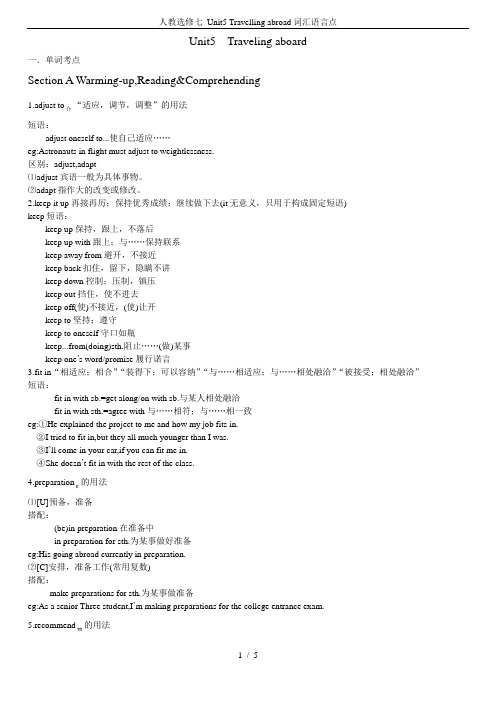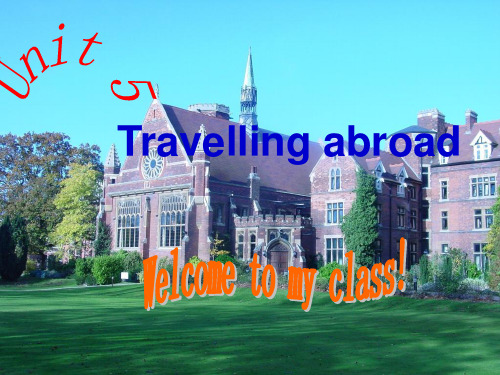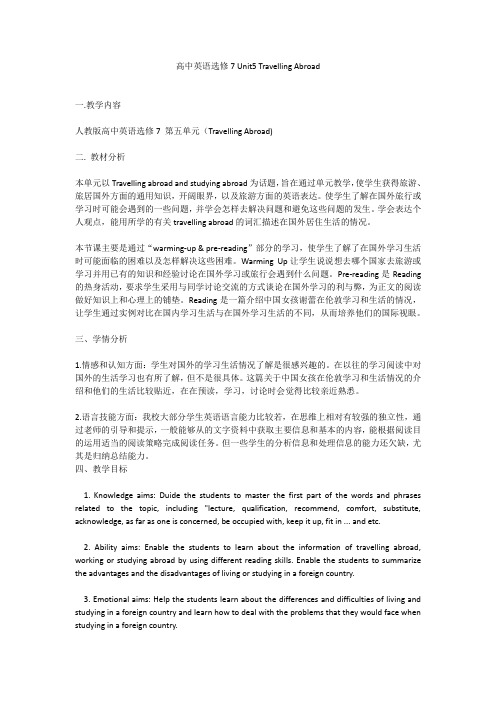Book7unit5 warming up&reading
人教版高中英语选修7Unit3知识点详解1

Part 1. Warming upPart 2. Pre-reading, reading and comprehending1.I thought,at the time,that this was just a story but then I witnessed it with my own eyes many time.我当时认为这只是个故事,但是后来我却屡次亲眼目睹了这样的事情。
witness vt.目睹;目击;为……作证句型witness to (doing/having done) sth.证明某事;证实做了某事Police are appealing to any driver who may have witnessed the accident.警方正呼吁曾目睹这事故的司机出面作证。
The 1980s witnessed increasing unemployment throughout Europe.20世纪80年代是全欧洲失业日益加剧的年代。
Her principal was called to witness to her good character.她的校长被传唤来证明她优良的品质。
The driver witnessed to having seen the man enter the building.司机作证说,他看到此人进入那栋建筑物。
n.证据;目击者He has been a witness to a terrible murder.他目击了一起残忍的凶杀事件。
His good health is a witness to the success of the treatment.他身体安康证明这种疗法是成功的。
2.One afternoon I arrived at the station, as I was sorting out my accommodation, I heard a loud noise coming from the bay.归纳总结accommodation n.住处;停留处;和解,调解;(pl.)住宿,膳宿(1)make accommodations for...为……提供膳宿book accommodation at a hotel向旅馆预订房间arrange sb.’s accommodation给某人安排住处……提供住宿〔或膳宿〕;容纳;为……提供空间;考虑到;顾及;帮助;给……提供方便;顺应,适应〔新情况〕accommodate...to=adapt...to使……适应accommodate oneself to=adapt (oneself) to适应;顺应……即学即用〔1〕客座艺术家们只好自掏腰包支付食宿费用。
人教选修七 Unit5 Travelling abroad词汇语言点

Unit5 Traveling aboard一.单词考点Section A Warming-up,Reading&Comprehending“适应,调节,调整”的用法1.adjust to介短语:adjust oneself to...使自己适应……eg:Astronauts in flight must adjust to weightlessness.区别:adjust,adapt⑴adjust宾语一般为具体事物。
⑵adapt指作大的改变或修改。
2.keep it up再接再厉;保持优秀成绩;继续做下去(it无意义,只用于构成固定短语)keep短语:keep up保持,跟上,不落后keep up with跟上;与……保持联系keep away from避开,不接近keep back扣住,留下,隐瞒不讲keep down控制;压制,镇压keep out挡住,使不进去keep off(使)不接近,(使)让开keep to坚持;遵守keep to oneself守口如瓶keep...from(doing)sth.阻止……(做)某事keep one’s word/promise履行诺言3.fit in“相适应;相合”“装得下;可以容纳”“与……相适应;与……相处融洽”“被接受;相处融洽”短语:fit in with sb.=get along/on with sb.与某人相处融洽fit in with sth.=agree with与……相符;与……相一致eg:①He explained the project to me and how my job fits in.②I tried to fit in,but they all much younger than I was.③I’ll come in your car,if you can fit me in.④She doesn’t fit in with the rest of the class.的用法4.preparationn⑴[U]预备,准备搭配:(be)in preparation在准备中in preparation for sth.为某事做好准备eg:His going abroad currently in preparation.⑵[C]安排,准备工作(常用复数)搭配:make preparations for sth.为某事做准备eg:As a senior Three student,I’m making preparations for the college entrance exam.5.recommend的用法vt⑴推荐,赞许搭配:recommend sb./sth.to sb.向某人推荐/介绍某人或某物recommend sb.for...推荐某人做(某职位)recommend sb.as...推荐某人为……eg:①We recommend him for the job.②Can you recommend a good teacher to my son?⑵劝告,建议搭配:recommend doing sth.建议做某事recommend sb.to do sth.建议某人做某事recommend sb.sth.(=recommend sth.to sb.)给某人介绍某物recommend that sb.should do sth.建议某人做某事eg:①He recommended to buy that book.②My father recommended us to go out for a walk.fort的用法⑴作n时,[C]“令人感到安慰的人或事物”eg:The child is a great comfort to her.⑵作n时,[U]“舒适,身体健康,安逸;安慰;慰藉”搭配:in comfort舒适地for comfort为了舒服give comfort to sb.安慰某人take/have/find comfort in sth.从……中得到安慰eg:They had enough money to live in comfort in their old age.⑶作vt时,“安慰(某人)”搭配:comfort sb.for sth.因某事安慰某人comfort sb.with sth.用……安慰某人eg:The letter from home comforted him.7.substitute的用法⑴作n时,“代替者,代用品”搭配:a substitute for sth.某物的代替品/者as a substitute作为代理人/代用品eg:Water is not a proper substitute for wine.⑵作v时,“用……代替……”(后接for)搭配:substitute A for B=substitute B with/by A用A代替Bsubstitute for sb./sth.代替某人/某物eg:I can substitute milk for cream.=I can substitute cream with/by milk.区别:substitute,replace⑴substitute指暂时代替或代理。
人教选修七 Unit5 Travelling abroad词汇语言点

Unit5 Traveling aboard一.单词考点Section A Warming-up,Reading&Comprehending“适应,调节,调整”的用法1.adjust to介短语:adjust oneself to...使自己适应……eg:Astronauts in flight must adjust to weightlessness.区别:adjust,adapt⑴adjust宾语一般为具体事物。
⑵adapt指作大的改变或修改。
2.keep it up再接再厉;保持优秀成绩;继续做下去(it无意义,只用于构成固定短语)keep短语:keep up保持,跟上,不落后keep up with跟上;与……保持联系keep away from避开,不接近keep back扣住,留下,隐瞒不讲keep down控制;压制,镇压keep out挡住,使不进去keep off(使)不接近,(使)让开keep to坚持;遵守keep to oneself守口如瓶keep...from(doing)sth.阻止……(做)某事keep one’s word/promise履行诺言3.fit in“相适应;相合”“装得下;可以容纳”“与……相适应;与……相处融洽”“被接受;相处融洽”短语:fit in with sb.=get along/on with sb.与某人相处融洽fit in with sth.=agree with与……相符;与……相一致eg:①He explained the project to me and how my job fits in.②I tried to fit in,but they all much younger than I was.③I’ll come in your car,if you can fit me in.④She doesn’t fit in with the rest of the class.的用法4.preparationn⑴[U]预备,准备搭配:(be)in preparation在准备中in preparation for sth.为某事做好准备eg:His going abroad currently in preparation.⑵[C]安排,准备工作(常用复数)搭配:make preparations for sth.为某事做准备eg:As a senior Three student,I’m making preparations for the college entrance exam.5.recommend的用法vt⑴推荐,赞许搭配:recommend sb./sth.to sb.向某人推荐/介绍某人或某物recommend sb.for...推荐某人做(某职位)recommend sb.as...推荐某人为……eg:①We recommend him for the job.②Can you recommend a good teacher to my son?⑵劝告,建议搭配:recommend doing sth.建议做某事recommend sb.to do sth.建议某人做某事recommend sb.sth.(=recommend sth.to sb.)给某人介绍某物recommend that sb.should do sth.建议某人做某事eg:①He recommended to buy that book.②My father recommended us to go out for a walk.fort的用法⑴作n时,[C]“令人感到安慰的人或事物”eg:The child is a great comfort to her.⑵作n时,[U]“舒适,身体健康,安逸;安慰;慰藉”搭配:in comfort舒适地for comfort为了舒服give comfort to sb.安慰某人take/have/find comfort in sth.从……中得到安慰eg:They had enough money to live in comfort in their old age.⑶作vt时,“安慰(某人)”搭配:comfort sb.for sth.因某事安慰某人comfort sb.with sth.用……安慰某人eg:The letter from home comforted him.7.substitute的用法⑴作n时,“代替者,代用品”搭配:a substitute for sth.某物的代替品/者as a substitute作为代理人/代用品eg:Water is not a proper substitute for wine.⑵作v时,“用……代替……”(后接for)搭配:substitute A for B=substitute B with/by A用A代替Bsubstitute for sb./sth.代替某人/某物eg:I can substitute milk for cream.=I can substitute cream with/by milk.区别:substitute,replace⑴substitute指暂时代替或代理。
七年级英语上册Unit 5教案人教新目标版

精品基础教育教学资料,请参考使用,祝你取得好成绩!Unit 5 Do you have a soccer ball?一、单元教学内容分析本单元的核心语言项目是ask and answer questions about ownership, 以及make suggestions。
主要话题是spending time with friends,学习邀请朋友运动以及谈论自己对某项运动的感觉等。
从Section A的sports things, 从have 的句型运用到语篇中的综合运用,循序渐进,逐步扩展。
二、教学目标1、能力目标(1)对所属关系进行问答,如:Do you have a soccer ball?(2)提出建议,发出邀请。
如:Let's play soccer.(3)谈论自己的感受。
如:That sounds good.2、知识目标(1)have 的一般现在时用法(2)一些球类用品名称(3)表达感受的几个形容词(4)提出建议的句型:Let's… .3、情感态度目标(1)由于该单元话题贴近学生生活,符合他们热爱运动的心理,可以提高他们学习英语的兴趣,积极参与英语实践活动。
(2)谈论与朋友共度时光,培养同学间团结,友爱的精神。
(3)谈论自己的感受,同时使学生在英语交流中注意并理解他们的情感。
三、教学重点难点1、教学重点Drill: Do you/they have…?Does he/she have…?I don't have…?He/She doesn't have… .Let's… .That sounds… .2、教学难点have 在一般现在时中的肯定,否定,一般疑问等形式。
尤其当主语为第三人称单数时。
四、课时安排1、Section A 1a. 1b. 1c. 2a. 2b2、Section A 2c. 3a. 3b. 43、Section B 1a. 1b. 2a. 2b. 2c4、Section B 3a. 3b. 3c. 4Period One Section A 1a-2b一、教学目标1、单词:soccer ball ,tennis racket ,ping-pong ball ,volleyball ,TV2、句型:Do you have a… ?Yes, I do./No, I don't.二、教学重点:掌握关于运动物品的名词三、教学难点:学会使用句型Do you have a… ? Yes, I do./No, I don't.四、教学设计Step1 Warming up:使用所学句型进行快速问答,激发学生快速反应和应变能力。
人教新目标英语九年级Unit5全单元教案

人教新目标英语九年级Unit 5 What are the shirts made of?Section A 1 (1a-2d)一、教学目标:1. 语言知识目标:1) 能掌握以下单词:chopsticks, coin, fork, blouse, silver, glass, cotton, steel, grass,leaf, produce, widely, be known for, process, pack 能掌握以下句型:①—This ring looks nice. Is it made of silver?—Yes, and it was made in Thailand.②What is it made of/from?③China is famous for tea, right?④Where is tea produced in China?2) 能够用英语描述及询问物品的制作材料,正确理解被动语态的用法及句子结构。
2. 情感态度价值观目标:了解一些日常用品的制成材料,增加生活常识,养成良好的生活习惯;了解一些地方知名产品或传统艺术品的制作过程以及制作材料,培养学生的民族自豪感及爱国主义精神。
二、教学重难点1. 教学重点:1) 掌握本课时中出现的生词2) 能够用英语描述及询问物品的制作材料3)正确理解被动语态的用法及句子结构。
2. 教学难点:理解被动语态的用法及句子结构。
三、教学过程Ⅰ. Warming up1. Present the sentence structure, using the pictures on the big screen:—What’s the golden medal made of?—It’s made of gold.—Is this table made of wood?—No, it isn’t. It’s made of glass.—Is Butter made from meat?—No. It’s made from milk.II. Presentation1. Show some pictures on the big screen. Try to learn the new words using “be made of”structure.Learn the new words: chopsticks, coin, fork, blouse, silver, glass, cotton, steel, grass, leaf2. Ss discuss with their partner and try to learn the new words.3. Give Ss five more minutes to remember the new words.4. Work on 1a:Let Ss read the things and materials in 1a. Discuss with their partners and match them with the materials. More than one answer is possible.What are these things usually made of? Match them with the materials. More than one answer is possible.Check the answers with the Ss.III. Listening1.T: Tell Ss they will hear a conversation about some things and material. Listen andmatch the products with what they are made of and where they were made.2. Let one student read the words in the box, Play the recording for the Ss to listen.3. Ss try to listen and match the things with the material and here they were made.4. Play the recording again. Let Ss answer the questions.1) How much did Susan pay for the three shirts?29 dollars.2) What does Anita feel about the three shirts?Cheap.3) What are the shirts made of?Cotton.4) Where were they made?America.5) Where did Susan buy the chopsticks?Korea.6) How does Anita like the chopsticks?Cool.7) What else does Susan show?Ring.8) Where was the ring made?Thailand.9) What will Susan do with the ring?She give it to her friend.IV. Pair work1. Read the conversation in the box in 1c.2. Ss try to made conversations using the information in 1b.e.g. A: Your new shirt looks very nice. Is it made of cotton?B: No, it isn’t. It’s made of silk.3. Let some pairs read out their conversations.V. ListeningPre-listeningfair adj. 公平的; 合理的; 美丽的fair n. an event at which people orbusinesses show and sell productsa book faira trade fairWork on 2a:T: Let’s listen to another conversation between Nick and Marcus.1. What are they talking about? First, let’s look at the pictures and the phrases in 1a.(Let one students read the phrases in 2a.)Listen and check ( √) the main topic of Nick and Marcus’ conversation.____ the science museum____ the art and science fair____ environmental protection____ a model plane____ a beautiful painting____ grass and leaves2. Play the recording for the Ss to listen and check the phrases.3. Play the recording again to check the answers.Work on 2b:1. Let Ss read the sentences below. Explain some main sentences for the Ss. Make sure they know what to do.2. Let Ss read the questions in 2b. Make sure they understand the meaning of each question.Play the recording for the Ss to answer the questions. (If necessary, using the pause button.)1) Where is the art and science fair?_________________________2) Do Nick and Marcus have to pay to go?_________________________3) What is the model plane made of?_________________________4) What is the painting made from?__________________________3. Play the recording again and mark true or false.1) The art and science fair is just inside the science museum.2) The fair is mainly about planes and paintings.3) All the works at the fair were made by university students.4) The model plane is very big.5) The painting is made of wool and grass.6) The students are asked to pay for the art and science fair.7) The students are interested in environmental protection and recycling.VI. Pair work1. Tell Ss to make a conversation using the information in 2a and 2b.e.g.A: What did you see at the art and science fair?B: I saw a model plane.A: What is it made of?B: It’s made of steel, glass, and plastic.2. Let Ss make their own conversations.3. Practice their conversations in pairs.VII. Role-play1. Work on 2dRead the conversation and complete the blanks.1) Chinese _____________ tea both in the past and now.2) _________ I know, tea plants _________ on the sides of mountains.3) When the leaves are ready, they _______ by hand and then _______ for processing.4) The tea ____________ and sent to many different countries and places around China.5) People say that tea ___________ ____ health _____ business!2. Read the conversations and Let Ss read after the teacher.3. Ask Ss to role-play the conversation in groups.VIII. Language points1. What is the model plane made of?What is the painting made from?be made of与be made from 辨析两词组都是“由……制成的”之意。
book7Unit_5_Traveling_Abroad_warming_up_&_reading

Keep it up, Xie Lei Chinese student fitting in well
The main idea The text is about an interview with Xie Lei, who is studying broad. She talks about her first few months at an English school
Match the main idea with each paragraph.
P1 P2 P3 P4 P5 P6 P7 No.1 XieLei’s preparation year(一年预 科) No.2 Benefits of her preparation course No.3 The author’s best wish for XieLei No.4 Benefits of living with a host family No.5 Xie Lei’s new plan No.6 Xie Lei, a Chinese girl, came to study in London No.7 Xie Lei’s difficulty getting used to
Does she get any benefits or difficulties from studying abroad ? What are they?
benefits of living with a host family of doing a preparation course
of having a tutor
2. What do you think a Chinese student will find different from studying at a Chinese university? They will find it’s not easy to study in a foreign country. The different teaching methods, different learning methods and different situations, they should adapt to all things quickly.
高中英语Unit5Musicpart1WarmingUp检测含解析新人教版必修

Part 1 Warming Up, Pre-reading, Reading & Comprehending基础过关练Ⅰ.单词拼写1.He (假装) to be taking the online course when his mother came in.2.Many researchers believe that heavy television-watching affects students' school (表现).3.When the music started, tears (滚落) down his cheeks.4.She e a living as a part-time secretary two years ago.5.I was so f with him that I recognized his voice the moment I picked up the phone.6.All payments can be made through the smart phone, so no c is needed. Ⅱ.选词填空1.I, who have been in this school for five years, quite the campus.2.Great importance should the prevention and control of COVID-19.3.Mack Dagger is a millionaire, who, since he was a little boy, flying to space.4. , I just don't want to go.5.The farmers will be paid for their grain , instead of by cheque.6.When Amy her dad, he got mad.7.The meeting didn't until noon.8.You can me to keep your secret.Ⅲ.单句语法填空1.Her (humor) story made me burst into laughter.2.A career in law is becoming increasingly (attract) to young people.3.Medical workers in the hospital (attach) to the medical college nearby are vaccinating (给……接种疫苗) people in this community against COVID-19 this week.4.He didn't want to go to school, so he pretended (be) ill.5.His voice on the phone was familiar me.6.You may rely on that the work will be finished ahead of time.Ⅳ.完成句子1.把它拿近点,以便我能看得清楚些。
高中英语选修7 Unit5 Travelling Abroad教案

高中英语选修7 Unit5 Travelling Abroad一.教学内容人教版高中英语选修7 第五单元(Travelling Abroad)二. 教材分析本单元以Travelling abroad and studying abroad为话题,旨在通过单元教学,使学生获得旅游、旅居国外方面的通用知识,开阔眼界,以及旅游方面的英语表达。
使学生了解在国外旅行或学习时可能会遇到的一些问题,并学会怎样去解决问题和避免这些问题的发生。
学会表达个人观点,能用所学的有关travelling abroad的词汇描述在国外居住生活的情况。
本节课主要是通过“warming-up & pre-reading”部分的学习,使学生了解了在国外学习生活时可能面临的困难以及怎样解决这些困难。
Warming Up让学生说说想去哪个国家去旅游或学习并用已有的知识和经验讨论在国外学习或旅行会遇到什么问题。
Pre-reading是Reading 的热身活动,要求学生采用与同学讨论交流的方式谈论在国外学习的利与弊,为正文的阅读做好知识上和心理上的铺垫。
Reading是一篇介绍中国女孩谢蕾在伦敦学习和生活的情况,让学生通过实例对比在国内学习生活与在国外学习生活的不同,从而培养他们的国际视眼。
三、学情分析1.情感和认知方面:学生对国外的学习生活情况了解是很感兴趣的。
在以往的学习阅读中对国外的生活学习也有所了解,但不是很具体。
这篇关于中国女孩在伦敦学习和生活情况的介绍和他们的生活比较贴近,在在预读,学习,讨论时会觉得比较亲近熟悉。
2.语言技能方面:我校大部分学生英语语言能力比较若,在思维上相对有较强的独立性,通过老师的引导和提示,一般能够从的文字资料中获取主要信息和基本的内容,能根据阅读目的运用适当的阅读策略完成阅读任务。
但一些学生的分析信息和处理信息的能力还欠缺,尤其是归纳总结能力。
四、教学目标1. Knowledge aims: Duide the students to master the first part of the words and phrases related to the topic, including "lecture, qualification, recommend, comfort, substitute, acknowledge, as far as one is concerned, be occupied with, keep it up, fit in ... and etc.2. Ability aims: Enable the students to learn about the information of travelling abroad, working or studying abroad by using different reading skills. Enable the students to summarize the advantages and the disadvantages of living or studying in a foreign country.3. Emotional aims: Help the students learn about the differences and difficulties of living and studying in a foreign country and learn how to deal with the problems that they would face when studying in a foreign country.五、教学重点及难点1. Widen the vocabulary range. Develop the students’reading skills namely skimming and scanning and so on.2. Guide the students to summarize the benefits and difficulties of living in a foreign country.六. 教学方法1.演示法:通过相关的图片、PPT等网络多媒体辅助显示给学生看,便于学生对基础知识和背景知识的把握,并从旧知识中获得启迪,从而达到解决问题的目的。
- 1、下载文档前请自行甄别文档内容的完整性,平台不提供额外的编辑、内容补充、找答案等附加服务。
- 2、"仅部分预览"的文档,不可在线预览部分如存在完整性等问题,可反馈申请退款(可完整预览的文档不适用该条件!)。
- 3、如文档侵犯您的权益,请联系客服反馈,我们会尽快为您处理(人工客服工作时间:9:00-18:30)。
2015-4-10
2. Why is she doing a preparation course first?
Because studying in England is different from studying in China and she needs to learn about these differences and improve her English.
2015-4-10
of doing a preparation course
academic requirements fulfill 1. to learn how to ____Western _____________.
way of life 2. to get used to a new _________.
2015-4-10
3. Why did Xie Lei feel like a child when she first arrived in England?
Because she has to learn how to do everyday things like using a telephone, paying on a bus, finding her way around a strange city; understanding English as spoken in real life; learning how to write essays acceptable to her British lecturer.
5. Why has Xie Lei decided to join a few clubs?
Because she thinks it’s important to have a Balance between study and a social life, and she wants to make new friends.
2015-4-10
4.Which two types of people have helped Xie Lei most since she came to England? A. Her classmates. C.A host family B. Tutors D. Her family
2015-4-10
1. What has Mei Jie been doing on the
Internet? She has been doing research for her holiday. 2. Where is Mei Jie planning to go for her holiday? France and Italy.
2. How is she going to save money on food? She will cook some meals for herself. 3. How is she going to travel in Italy and France? 2015-4-10 By train.
2015-4-10
Advantages help us to be independent. would be easier to learn a foreign language. easier to learn advanced knowledge and technology. learn a lot about local customs and broaden our views. fun to live in a new country. relaxing have many new experiences
2015-4-10
Warming up
Do you like traveling?
If you could go anywhere in the world, which country would you like to visit? Why?
2015-4-10
What is it?
London Bridge
2015-4-10
Italy( Venice威尼斯)
Japan (Fuji mountain富士山)
2015-4-10
Taj Mahal
泰姬陵
India
2015-4-10
People have more and more opportunities to travel or study abroad. Travelling helps us learn a lot about local customs and broaden our views. So, quite a few people try to study abroad.
taxis
DVDs √ 2015-4-10 entry to museums
Keep it up, Xie Lei Chinese student fitting in well
2015-4-10
1 What do you think she might find difficult?
2 Will she overcome the difficulties at last? How? 3 Who will help her?
2015-4-10
Ⅲ.Detailed reading
While studying in London, Xie Lei has some difficulties as well as benefits. Read the passage again, and try to find them according to the diagram given.
Benefits
Fast reading:
The main idea of the whole text.
It mainly talks about the Chinese university ______ study student Xie Lei’s __________ and ______, life ____ especially about some benefits she gets as well as some _______ difficulties _______ she faces while studying in London.
Princeton University
Harvard University
2015-4-10
总统的摇篮
2015-4-10
Yale University
科技宠儿的摇篮
2015-4-10
Massachusetts Institute of Technology
What are the advantages and disadvantages of studying in a foreign country?
Listen and check the answers.
Tick the things Mei Jie has planned for in her budget. √accommodation √ food √ phone calls
√train travel
clothes √emergency √souvenirs travel insurance
2015-4-10
Find out the main idea of each paragraph.
Para1
Xie Lei’s feelings before she went abroad.
Para2 The general introduction to Xie Lei and her study. Para3 The difficulties Xie Lei met while living in London. Para4 The advantages that Xie Lei gained while living with a host family. Para5 Xie Lei is getting used to the Western University’s way of learning. Para6 Xie Lei is now getting along well and is living an active life. para7 The newspaper will follow Xie Lei’s progress in 2015-4-10 later editions.
2015-4-10
Fast-reading
1. What is Xie Lei in England for? How long
has she been in England?
She is in England to study at a university. She’s been in England for six months.
2015-4-10
United States (New York & San Francisco )
2015-4-10
Vancouver
2015-4-10
France (Paris) Triumphbogen
2015-4-10
Roman Colosseum
The Toห้องสมุดไป่ตู้er of Pisa
2015-4-10
2015-4-10
3. When is she planning to go? In July. 4. Has she finished all her preparations for the holiday? No, not yet. There’s still lots to do. She has to apply for a passport and a visa. She has to find out about travel insurance.
